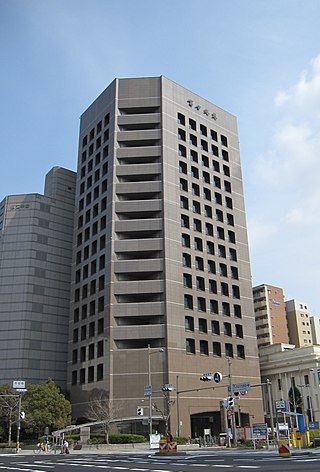An initial public offering (IPO) or stock launch is a public offering in which shares of a company are sold to institutional investors and usually also to retail (individual) investors. An IPO is typically underwritten by one or more investment banks, who also arrange for the shares to be listed on one or more stock exchanges. Through this process, colloquially known as floating, or going public, a privately held company is transformed into a public company. Initial public offerings can be used to raise new equity capital for companies, to monetize the investments of private shareholders such as company founders or private equity investors, and to enable easy trading of existing holdings or future capital raising by becoming publicly traded.

Japan Post was a Japanese statutory corporation that existed from 2003 to 2007, offering postal and package delivery services, banking services, and life insurance. It is the nation's largest employer, with over 400,000 employees, and runs 24,700 post offices throughout Japan. One third of all Japanese government employees work for Japan Post. As of 2005, the President of the company was Masaharu Ikuta, formerly Chairman of Mitsui O.S.K. Lines Ltd.

The Tokyo Metro is a major rapid transit system in Tokyo, Japan, operated by the Tokyo Metro Co. With an average daily ridership of 6.52 million passengers, the Tokyo Metro is the larger of the two subway operators in the city; the other being the Toei Subway, with 2.85 million average daily rides.

Singapore Exchange Limited is a Singapore-based exchange conglomerate, operating equity, fixed income, currency and commodity markets. It provides a range of listing, trading, clearing, settlement, depository and data services. SGX Group is also a member of the World Federation of Exchanges and the Asian and Oceanian Stock Exchanges Federation. It is ASEAN's second largest market capitalization after Indonesia Stock Exchange at US$609.653 billion as of September 2023.

Tokyo Electric Power Company Holdings, Incorporated is a Japanese electric utility holding company servicing Japan's Kantō region, Yamanashi Prefecture, and the eastern portion of Shizuoka Prefecture. This area includes Tokyo. Its headquarters are located in Uchisaiwaicho, Chiyoda, Tokyo, and international branch offices exist in Washington, D.C., and London. It is a founding member of strategic consortiums related to energy innovation and research; such as JINED, INCJ and MAI.
livedoor Co., Ltd. was a Japanese company that functioned as an Internet service provider and operator of a web portal and blog platform before being brought down by a scandal in 2006. The company was founded and led in its first 10 years by Takafumi Horie, known as "Horiemon" in Japan. Livedoor grew into one of Japan's premier Internet businesses, putting over 1,000 employees on its payroll at its peak. Its reliance on acquisitions and stock swap mergers to achieve growth also made it one of the country's most controversial enterprises. Its growth came to a resounding halt when scandal erupted in early 2006. An investigation of securities law violations led to a nosedive in the company's stock price. The Tokyo Stock Exchange delisted Livedoor on April 14, 2006. The floundering company's properties were purchased by South Korea–based NHN Corporation in 2010.

The Shanghai Stock Exchange is a stock exchange based in the city of Shanghai, China. It is one of the three stock exchanges operating independently in mainland China, the others being the Beijing Stock Exchange and the Shenzhen Stock Exchange. The Shanghai Stock Exchange is the world's third largest stock market by market capitalization exceeding $6 trillion in July 2024. It is also Asia's biggest stock exchange. Unlike the Hong Kong Stock Exchange, the Shanghai Stock Exchange is still not entirely open to foreign investors and often affected by the decisions of the central government, due to capital account controls exercised by the Chinese mainland authorities.

Mitsubishi Estate Company, Limited is one of the largest real-estate developers in Japan and is involved in property management and architecture research and design.

Genworth Financial, headquartered in Richmond, Virginia, provides life insurance, long-term care insurance, mortgage insurance, and annuities.

Hydro One Limited is an electricity transmission and distribution utility serving the Canadian province of Ontario. Hydro One traces its history to the early 20th century and the establishment of the Hydro-Electric Power Commission of Ontario. In October 1998, the provincial legislature passed the Energy Competition Act which restructured Ontario Hydro into separate entities responsible for electrical generation, transmission/delivery, and price management with a final goal of total privatization.

General elections were held in Japan on 11 September 2005 for all 480 seats of the House of Representatives, the lower house of the Diet. Prime Minister Junichiro Koizumi called the election almost two years before the end of the term taken from the previous elections in 2003, after bills to privatize Japan Post were voted down in the upper house, despite strong opposition from within his own Liberal Democratic Party (LDP).

The Dai-ichi Life Insurance Company, Limited, or Dai-ichi Life for short, is the third-largest life insurer in Japan by revenue, behind Japan Post Insurance and Nippon Life.
The main elements of Japan's financial system are much the same as those of other major industrialized nations: a commercial banking system, which accepts deposits, extends loans to businesses, and deals in foreign exchange; specialized government-owned financial institutions, which fund various sectors of the domestic economy; securities companies, which provide brokerage services, underwrite corporate and government securities, and deal in securities markets; capital markets, which offer the means to finance public and private debt and to sell residual corporate ownership; and money markets, which offer banks a source of liquidity and provide the Bank of Japan with a tool to implement monetary policy.

Japan Post Bank Co., Ltd. is a Japanese bank headquartered in Tokyo. It is a corporation held by Japan Post Holdings, in which the government of Japan has a majority stake.

The Japan Post Insurance Company, Ltd., is a Japanese life insurer that was established on October 1, 2007, with the privatization of Japan Post Life Insurance. It is owned by the Japan Post Holdings. As of 2011, it was the world's fourth largest insurance company as regards net premiums written behind three European insurers and the largest as regards non-banking assets.

Japan Post Holdings Co., Ltd. is a Japanese publicly traded conglomerate headquartered in Kasumigaseki, Chiyoda, Tokyo. It is mainly engaged in postal and logistics business, financial window business, banking business and life insurance business. The company offers letters and goods transportation services, stamp sales, deposits, loans, and insurance products.

China Pacific Insurance (Group) Co., Ltd. (CPIC) known as Pacific Insurance, is a Chinese insurance company. It was established on the basis of the former China Pacific Insurance Corporation, which was founded in 1991 approved by the People's Bank of China. Its headquarters is in Shanghai.

SBI Holdings, sometimes referred to as Strategic Business Innovator Group, is a financial services company group based in Tokyo, Japan. The group's businesses and companies are held primarily at SBI Holdings.

Verisk Analytics, Inc. is an American multinational data analytics and risk assessment firm based in Jersey City, New Jersey, with customers in insurance, natural resources, financial services, government, and risk management sectors. The company uses proprietary data sets and industry expertise to provide predictive analytics and decision support consultations in areas including fraud prevention, actuarial science, insurance coverage, fire protection, catastrophe and weather risk, and data management.

The Fuji Fire and Marine Insurance Co., Ltd. was a Japanese insurance company. The company had its corporate headquarters in the Kamiyacho MT Building located in the Toranomon neighborhood of Minato, Tokyo. It also had an Osaka office in Chuo-ku borough, Osaka. Due to a merger, the company is now AIG General Insurance Co., Ltd.














